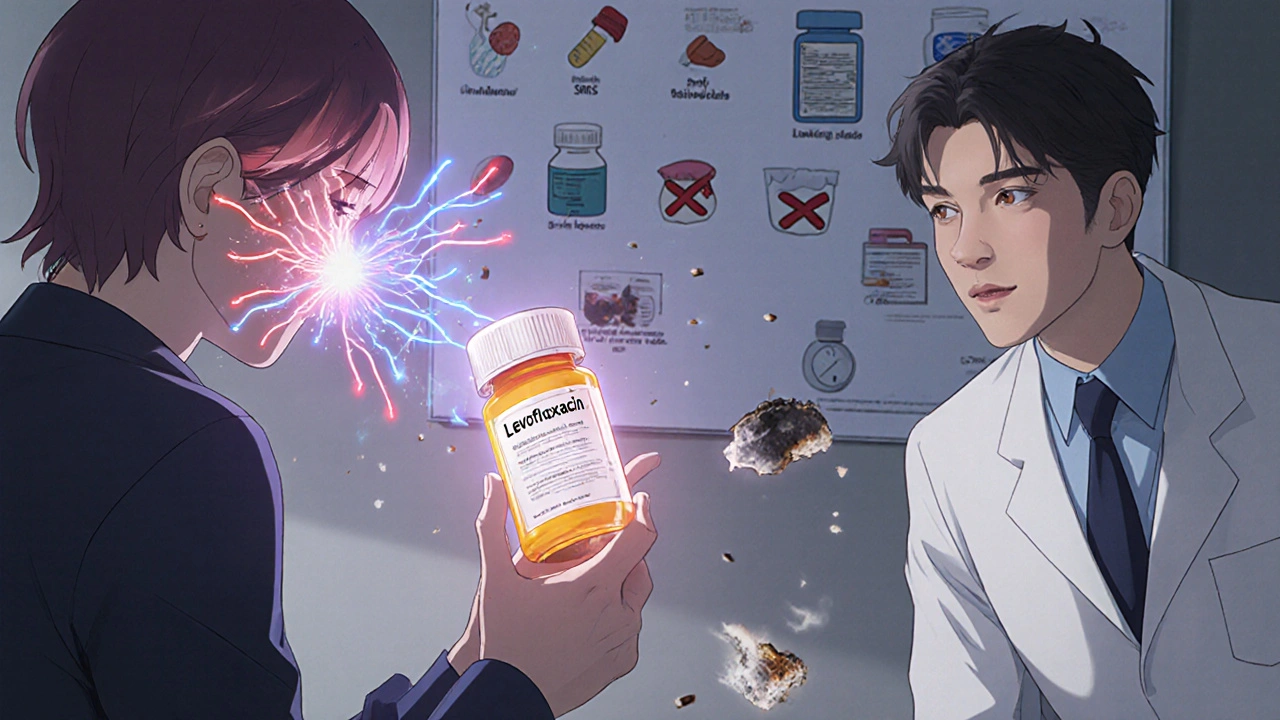Dysosmia Medication Risk Calculator
Medication Risk Assessment
This tool helps you understand your risk of developing smell or taste changes from medications you're currently taking. Based on information from MedLink Neurology and JAMA studies.
Have you ever taken a medication and suddenly noticed that your favorite coffee tastes like metal, or that bread smells like rotten eggs? You’re not imagining it. This isn’t just a weird coincidence-it’s a real, documented side effect called dysosmia. It’s when your sense of smell gets twisted, turning familiar scents into something unpleasant, or making you smell things that aren’t there at all. And it’s more common than you think.
What Exactly Is Dysosmia?
Dysosmia isn’t just losing your sense of smell-it’s having it break down. One moment you’re smelling fresh laundry; the next, it reeks like ash or burnt plastic. Some people report a constant metallic taste, even when they haven’t eaten anything metallic. Others smell cigarette smoke all day, even in a smoke-free room. These aren’t hallucinations. They’re real sensory distortions caused by how certain drugs interact with your nose and tongue.
This isn’t rare. Over 500 medications have been linked to smell and taste changes, according to MedLink Neurology’s 2022 update. That includes antibiotics, blood pressure drugs, seizure medications, and even some antidepressants. The problem? Most doctors don’t ask about it. A 2022 JAMA survey found only 37% of primary care doctors routinely check for smell changes when prescribing new meds. That means thousands of people suffer in silence, thinking it’s just "in their head"-when it’s actually in their chemistry.
Which Medications Are Most Likely to Cause This?
Not all drugs affect smell the same way. Some mess with your taste buds directly. Others disrupt the nerve signals from your nose to your brain. The biggest culprits fall into a few clear categories.
- Antibiotics: Fluoroquinolones like levofloxacin and moxifloxacin, and macrolides like azithromycin and clarithromycin, are top offenders. These drugs pull zinc and magnesium out of your taste cells, which are critical for sending smell signals. Studies show azithromycin increases risk by over 2.3 times compared to other antibiotics.
- Cardiovascular drugs: Midodrine, used for low blood pressure, has been tied to persistent metallic tastes. The exact mechanism isn’t fully understood, but it’s likely related to how it affects blood flow to sensory nerves.
- Neurological medications: Carbamazepine, used for seizures and nerve pain, can cause total loss of taste (ageusia) alongside smell distortion. Baclofen, a muscle relaxant, has also been linked to phantom smells.
- Other common offenders: Doxycycline, tolbutamide (for diabetes), and even some SSRIs like sertraline have shown up in case studies. Even IV drugs like lidocaine or iron infusions can trigger a metallic taste within minutes.
One 2021 case study followed a woman who took levofloxacin for a UTI. After 10 days, food started tasting like bile. She lost 8 pounds in three weeks because she couldn’t eat. Even after stopping the drug, the smell distortion lasted months.
Why Does This Happen? The Science Behind the Smell Breakdown
Your sense of smell isn’t just about your nose. It’s a complex chain of chemical signals. Odor molecules bind to receptors in your nasal lining, which then send messages through nerves to your brain. Drugs can interrupt this at any point.
Some medications, like fluoroquinolones, bind to zinc and magnesium-minerals your smell cells need to reset after detecting a scent. Without them, the receptors stay stuck in "on" mode, sending false signals. Others, like sertraline, slip into cell membranes and scramble the electrical signals inside taste and smell cells. Still others interfere with G-proteins or TRPM5 channels, which are essential for turning smells into nerve impulses.
It’s not just one pathway-it’s dozens. That’s why the same drug can cause different symptoms in different people. One person gets a metallic taste. Another smells burning rubber. A third can’t smell anything at all. It depends on which receptors the drug hits, and how your body reacts.

How Long Does It Last? Recovery and Timing
The good news? Most cases get better. The 1995 Schiffman and Nagle study found that 78% of people see improvement within three months after stopping the drug. But 22% don’t. And for some, the changes last over a year.
Timing matters. With antibiotics, symptoms often show up 7 to 14 days after starting the drug. That’s a key clue. If you start smelling smoke or metal right after beginning a new prescription, it’s likely the culprit-not a cold, not a sinus infection, not aging.
One Reddit user, "AnosmiaSurvivor92," developed parosmia after taking azithromycin. For 22 months, everything tasted like rotten eggs. She lost 15% of her body weight. She wasn’t alone. A 2023 Medindia survey of over 700 patients found that 68% of those with medication-induced dysosmia reported symptoms lasting beyond the end of treatment.
On the flip side, some people recover quickly. One case reported in Practical Neurology showed a patient’s taste distortion vanished within five days after switching from an antidepressant to mirtazapine. That’s why identifying the exact drug matters-it can point to the right fix.
What Can You Do About It?
First, don’t stop your medication without talking to your doctor. Many of these drugs treat serious conditions. But you can take action.
- Track your symptoms: Write down when the smell change started, what smells are distorted, and whether it’s tied to meals or specific meds.
- Ask your doctor: Say, "Could this be a side effect of my medication?" Mention dysosmia by name. Most doctors haven’t heard of it-but they can look it up.
- Request a smell test: The University of Pennsylvania Smell Identification Test (UPSIT) is a 40-item sniff test that can confirm if your sense of smell is impaired. It’s quick, non-invasive, and covered by many insurance plans.
- Consider alternatives: If your drug is on the high-risk list (like levofloxacin or azithromycin), ask if a different antibiotic or medication is available. Not all drugs in a class cause the same side effects.
There’s no universal cure. Zinc supplements are often suggested-but Dr. Thomas Hummel of the University of Dresden warns they can cause copper deficiency and don’t work for everyone. Dopamine blockers and GABA agonists have shown promise in lab studies, but they’re still experimental.
The best treatment right now? Time, and stopping the drug if it’s safe to do so.

When to Worry: Dysosmia vs. Something More Serious
Not every smell change is from a pill. Brain tumors, Parkinson’s, Alzheimer’s, and even long COVID can cause similar symptoms. That’s why it’s critical to get checked if:
- You have no recent medication changes but still smell smoke or rotting food
- You also have headaches, vision changes, or memory issues
- Your smell loss came on suddenly and is getting worse
Dr. Evan R. Snyder, writing in JAMA Otolaryngology in 2022, warns against jumping to the conclusion that every smell problem is drug-related. "Clinicians must maintain diagnostic vigilance," he says. A smell test and neurological evaluation can rule out other causes.
What’s Being Done to Fix This?
There’s growing awareness. The FDA now encourages drug makers to include smell and taste as endpoints in clinical trials. In 2024, the European Medicines Agency will require these assessments for all new antibiotics and heart drugs. AstraZeneca even filed a patent in 2022 for a treatment targeting drug-induced smell loss.
Researchers are testing new drugs that block TRPM5 channels-the same ones drugs like levofloxacin mess with. Phase II trials are underway (ClinicalTrials.gov NCT05214345). And the Global Chemosensory Research Consortium has already enrolled over 1,200 patients from 14 countries to track these side effects.
Still, progress is slow. Most electronic health records don’t even have a checkbox for "smell changes." Patients are left to figure it out themselves.
Support and Resources
You’re not alone. The nonprofit Fifth Sense runs monthly virtual support groups for people with medication-induced smell disorders. Over 150 people join each session to share stories and coping tips. The Smell and Taste Treatment and Research Foundation also offers a directory of specialists who know how to handle these cases.
If you’re struggling, start here:
- Keep a smell journal: Note what you smell, when, and what you were taking.
- Ask your pharmacist for a medication review-pharmacists often know side effects better than doctors.
- Join a support group. Talking to others who get it makes a huge difference.
Smell is more than just a sense. It’s tied to memory, safety, and pleasure. Losing it-or having it warp-can make life feel broken. But it’s treatable. And awareness is growing. The more people talk about it, the more doctors will listen.
Can antibiotics really change how food tastes?
Yes. Antibiotics like levofloxacin, azithromycin, and doxycycline are among the most common causes of dysosmia. They interfere with zinc and magnesium in taste cells, which can cause food to taste metallic, bitter, or like rotting food. Symptoms often start 7-14 days after starting the drug and can last weeks or months after stopping.
Is dysosmia permanent?
Most cases improve after stopping the medication-about 78% within three months. But 22% of people experience long-term changes, sometimes lasting over a year. The longer the symptoms persist, the more important it is to consult a specialist in smell and taste disorders.
Can I take zinc supplements to fix it?
Zinc is often recommended, but it’s not a guaranteed fix. While zinc deficiency can cause smell loss, most medication-induced dysosmia isn’t caused by low zinc. Taking extra zinc without a deficiency can lead to copper deficiency and worsen symptoms. Always talk to your doctor before starting supplements.
Should I stop my medication if I notice smell changes?
No-not without talking to your doctor. Many of these medications treat serious conditions like infections, high blood pressure, or seizures. Stopping them abruptly can be dangerous. Instead, report the symptom and ask if there’s an alternative drug that doesn’t cause smell distortion.
How do I know if it’s my medication or something else?
Look at timing. If the smell change started shortly after beginning a new drug, it’s likely related. But if you have other symptoms like headaches, vision changes, or memory problems, it could signal a neurological issue. A smell test (UPSIT) and neurological evaluation can help distinguish between medication side effects and other causes.

Bobby Marshall
November 1, 2025 AT 19:37Man, I never realized how much I took smell for granted until I went through this after my last round of azithromycin. Everything tasted like ash and old gym socks. I stopped eating for weeks-lost 10 lbs. Didn’t tell my doctor because I thought I was just being dramatic. Turns out I wasn’t. This post is a lifeline for people like me.
Cori Azbill
November 3, 2025 AT 15:54Oh please. This is just Big Pharma’s way of making you feel bad so you’ll blame them instead of your ‘bad lifestyle.’ You think antibiotics are the problem? Maybe you’re just eating too much processed garbage. I’ve been on levofloxacin for 3 years and my coffee still tastes like coffee. Stop being a hypochondriac.
Ardith Franklin
November 4, 2025 AT 22:40Did you know the FDA has been hiding this for decades? It’s not just antibiotics-it’s the fluoride in your water, the 5G towers, and the microchips in your vaccines. They want you to think it’s ‘medication side effects’ so you don’t ask why your nose is being weaponized. I’ve had phantom smoke smells since 2019. Coincidence? I think not.
Deon Mangan
November 5, 2025 AT 20:49So you’re telling me that after spending 20 grand on med school, doctors still don’t know this? 😂 And we wonder why people don’t trust the system. I’ve got a cousin who took sertraline and started smelling burnt toast 24/7. He went to 4 docs. All said ‘it’s stress.’ He’s on disability now. Thanks, medicine.
Vinicha Yustisie Rani
November 6, 2025 AT 15:54In India, we have a word for this-‘bhaavnaa ka bhoolna’-forgetting the feeling. But it’s not forgetting. It’s betrayal. Your nose used to tell you if food was safe, if someone was near, if your mother was cooking. When that breaks, you feel alone. I’m glad someone is talking about this. We need more awareness.
Aneesh M Joseph
November 8, 2025 AT 10:23Carlo Sprouse
November 8, 2025 AT 12:32While I appreciate the anecdotal nature of this piece, it lacks statistical rigor. The sample size of patient reports cited is non-representative, and the reliance on Reddit testimonials undermines clinical validity. Until peer-reviewed, double-blind studies confirm the prevalence and causality of medication-induced dysosmia, this remains speculative at best.
Cameron Daffin
November 9, 2025 AT 20:00I just want to say thank you for writing this. I’ve had this for 14 months after a course of doxycycline. I thought I was going crazy. I cried every time I tried to eat. My partner said I stopped smiling. I didn’t know anyone else felt this way. Reading this made me feel seen. I’m not alone. And if this helps even one person ask their doctor, it’s worth it. 💙
Jenny Kohinski
November 11, 2025 AT 14:47My mom had this after her heart meds. She stopped cooking because everything smelled like wet cardboard. We started a smell journal together-she’d write down what she smelled, I’d look up the med. We found a new pill that didn’t do it. Now she bakes pies again. 🥧 It’s small, but it’s everything. If you’re reading this and you’re struggling-you’re not broken. You’re just misunderstood.
Steve Dressler
November 12, 2025 AT 16:50I’m a pharmacist. I’ve seen this more than you’d think. Patients come in saying, ‘My coffee tastes like copper’ or ‘I smell smoke when there’s none.’ We don’t get trained on this. It’s not in the PDR like nausea or dizziness. But we know: fluoroquinolones, macrolides, and some antihypertensives are the usual suspects. If you’re on one of these and notice changes-come see me. I can help you find alternatives. You don’t have to suffer silently.
Paul Orozco
November 13, 2025 AT 18:32This article reads like a poorly researched blog post disguised as medical journalism. Where are the controlled trials? The sample sizes? The control groups? You cite Reddit users and case studies like they’re gospel. This isn’t science-it’s fearmongering wrapped in a pretty HTML template.
Carl Lyday
November 14, 2025 AT 07:08Hey Paul-I get your skepticism. But here’s the thing: science doesn’t always wait for RCTs to validate human experience. I’ve worked in ENT for 18 years. I’ve had patients with this exact issue. We don’t have perfect data, but we have enough to know it’s real. And if we wait for perfect studies before helping people? We fail them every day. This isn’t fearmongering. It’s advocacy.
Sharron Heath
November 15, 2025 AT 12:37Thank you for including the UPSIT test and the resources. This is exactly the kind of practical, compassionate information that’s missing from mainstream medical discourse. I’m sharing this with my clinic. We need more of this.